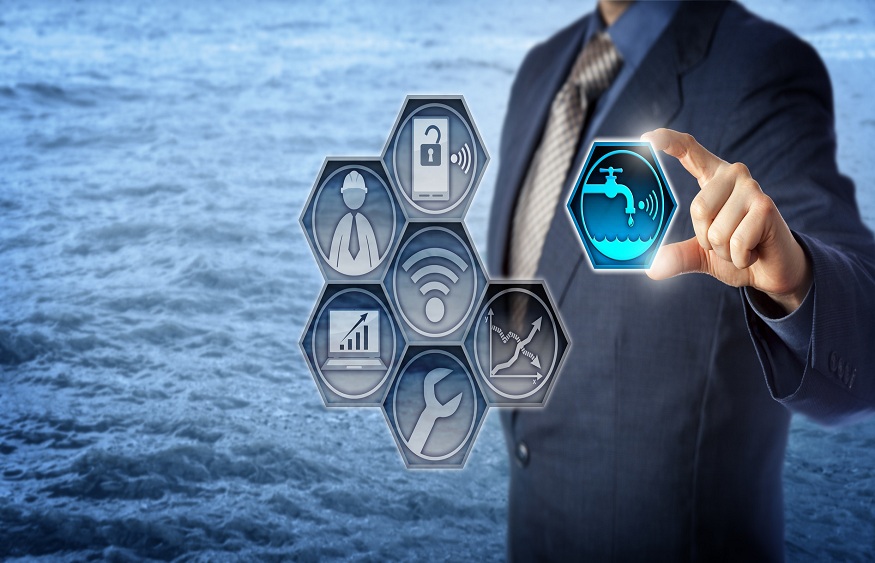In today’s rapidly advancing world, the concept of affordable housing is gaining increasing attention. As populations continue to grow, urbanization spreads its wings, and resources become scarcer, the need for innovative solutions to address housing challenges is more pressing than ever. Enter smart water solutions, a game-changing approach that seamlessly integrates smart technology-enabled solutions into affordable housing. These solutions not only enhance the quality of life for residents but also promote sustainability and resource management. Below, we will explore the significance of smart water solutions, particularly focusing on smart water tank monitoring systems and housing society apps, as an integral part of reshaping housing societies and communities for a better future.
- Real-Time Monitoring: Smart water solutions provide real-time data on water usage, quality, and distribution, allowing for immediate responses to issues like leaks or unusual consumption patterns. This real-time monitoring is crucial for optimizing water management practices. With the ability to track water levels and quality continuously, water system operators can take proactive measures to address potential problems swiftly. This not only reduces water wastage but also minimizes the risk of infrastructure damage caused by leaks or bursts.
- Water Conservation: Smart water solutions play a pivotal role in water conservation efforts. By identifying and addressing areas of water wastage, such as leaks or excessive consumption, these solutions promote responsible water use. They enable users and organizations to track their water usage patterns and make informed decisions to reduce consumption. Through the integration of real-time data and user-friendly interfaces, residents and facility managers can actively participate in water conservation initiatives. Moreover, the reduction in water consumption has a positive environmental impact, conserving precious natural resources and reducing the energy required for water treatment and distribution. This aligns with the global sustainability goals and demonstrates a commitment to responsible resource management.
- Early Leak Detection: Early leak detection is a cornerstone of smart water solutions, offering numerous benefits. These systems employ sensors and data analysis to identify leaks as soon as they occur, often before they become visible or cause significant damage. This swift detection and notification allow for timely repairs, preventing costly infrastructure damage and minimizing water loss. Leaks can lead to not only increased water bills but also structural damage, mold growth, and other issues. By addressing leaks promptly, smart water solutions help avoid these problems and the associated repair costs. Moreover, early leak detection contributes to water conservation efforts by reducing unnecessary water wastage. Overall, this feature is essential for safeguarding both financial resources and the integrity of water infrastructure, making it a valuable component of smart water management.
- Billing Accuracy: Smart water solutions enhance billing accuracy by ensuring that residents and users are billed based on their actual water consumption. The precise data collected by these systems eliminates discrepancies and billing disputes, fostering transparency in financial transactions. Inaccurate billing can lead to dissatisfaction among customers and residents, eroding trust in service providers. With smart water solutions, billing is based on real-time consumption data, providing users with a clear and verifiable record of their water usage. This not only promotes trust but also encourages responsible water consumption.
- Remote Control: Remote control capabilities are a key feature of smart water tank monitoring systems, offering efficient management of water distribution systems without the need for physical intervention. These capabilities empower operators and facility managers to make adjustments, monitor performance, and respond to changing demands from a centralized location. This remote control significantly reduces the need for on-site visits, saving time and resources. For example, operators can adjust water flow rates, open or close valves, and manage pumps remotely to optimize water distribution. This flexibility is particularly valuable in emergencies or during periods of high demand when quick responses are critical.
- Data-Driven Decision-Making: Smart water solutions enable data-driven decision-making in water management. By collecting and analyzing data on water usage patterns and trends, these systems provide valuable insights that inform decisions aimed at optimizing water resources. Data-driven decision-making allows operators and facility managers to identify areas for improvement, allocate resources effectively, and respond proactively to emerging issues. For example, the data can reveal consumption patterns that suggest potential leaks or inefficient water distribution. With these insights, operators can take targeted actions to address the problem before it escalates.
- Environmental Impact: Smart water solutions have a positive environmental impact by reducing water consumption and promoting more efficient water management practices. By conserving water resources, these solutions contribute to environmental sustainability and mitigate the environmental footprint associated with water treatment and distribution. Reduced water consumption directly translates into less strain on local water sources and ecosystems, helping to maintain the ecological balance.
- Improved Quality of Life: Smart water solutions lead to an improved quality of life for residents and users by empowering them with real-time data and promoting responsible water consumption. Through user-friendly interfaces and mobile apps, residents can actively monitor their water usage and gain insights into their consumption patterns. This awareness fosters a sense of responsibility for resource conservation and encourages residents to adopt water-saving habits. It also promotes transparency in billing and water usage, enhancing trust in service providers.
- Prevent Water Shortages: Smart water solutions are invaluable in regions susceptible to water shortages, as they help prevent scarcity by optimizing water distribution and ensuring a stable water supply. In areas prone to droughts or water scarcity, the efficient management of available water resources is crucial for maintaining a reliable water supply for residents, businesses, and industries. These solutions actively monitor water levels and consumption, allowing operators to detect and respond to fluctuations in demand promptly. By identifying and addressing potential shortages early, they help mitigate the impact of water scarcity and reduce the risk of disruptions in water supply.
The integration of smart water solutions, smart water tank monitoring systems, and housing society apps into affordable housing represents a visionary approach to addressing the challenges of housing in the 21st century. This unique and innovative approach not only improves the quality of life for residents but also promotes sustainability, resource conservation, and technological advancement. As affordable housing projects continue to evolve, smart water solutions will play an increasingly vital role in shaping communities for a better and more prosperous future. By embracing these solutions, housing societies can pave the way for a new era of affordable and sustainable living.

